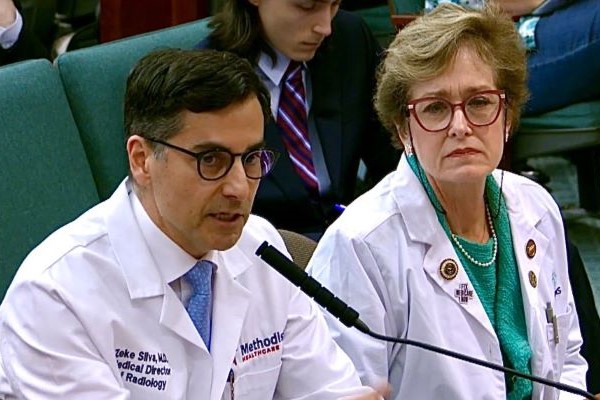
By Ezequiel “Zeke” Silva III, MD, TMA Council of Legislation chair
As chair of the Texas Medical Association’s Council on Legislation, I had the opportunity to go behind the scenes of the legislative process and embed myself with the TMA lobby team – often from morning hearings to late-night votes. It was an eye-opening experience, and I gained valuable insights every association member should know.
TMA’s lobby team is widely considered one of the most effective at the Capitol. For the past two decades, it’s been ranked either No. 1 or No. 2 in the Capitol Inside’s ratings. Sitting shoulder-to-shoulder with the team this session gave me new appreciation for what success requires. It isn’t titles or past wins – it’s relentless preparation, trusted relationships, and unwavering credibility. Frankly, the mental and physical demands on our lobby team, along with the incredible and incomparable support from the legal and policy staff, were eye-opening to witness.
The legislative session may happen only 140 days every other year, but for TMA the legislative process is 24 hours, seven days a week, and year-round. Right after the session ends, TMA staff – policy, legal, and lobby teams – do a SWOT (strengths, weaknesses, opportunities, and threats) analysis, and digest the lessons learned to prepare for the next session. It’s during the interim, the year before the actual session occurs, when the strategic foundation on each major issue is established. I was asked to testify on key TMA issues more than once during this period.
Once the session starts, TMA’s work goes into high gear. I was encouraged so many lawmakers trust TMA’s insights on policy and politics and seek us out to help with drafting or refining bills.
Once the bill-filing period begins, I was struck to learn TMA staff reviews every single bill, close to 9,000 bills this session alone, then conducts an analysis on its impact, prioritizes it against TMA’s top issues, and tracks its progress throughout the session – no exceptions. The pace of the session is rapid as bills move through their respective committees.

I testified at hearings weekly, often two or three a day, along with many other TMA members. It is not uncommon to spend 10 or more hours waiting for a bill to be heard – then have five minutes to act before a critical vote. Legislators know if TMA is there or not, even if just in the room, not just testifying, and we do make a difference at this stage. Once a bill gets voted out of committee, it goes to floor debate and is voted on; once it finishes one chamber, it starts all over again in the other chamber. All bills must pass through the Texas House and Senate before they get to the governor’s desk.
The pace is exhausting. One part of the process that I now appreciate is critical: Before bills get to the House floor, they must go through the House Committee on Calendars, which is a completely different set of politics our team must navigate.
Relationships drive outcomes
Politics is personal, and TMA’s influence completely depends on years of trusted and enduring relationships. The TMA lobby team’s unique skills draw upon their many relationships and deep experience at the Capitol. Most TMA lobbyists served as staffers before becoming lobbyists. They know which members are engaged, which staffers get things done, and how to work within the rhythms of the process. One of the most important tools of TMA’s lobbying efforts is the many legislative relationships physicians have in their communities. When a local physician testifies or calls their legislator, it absolutely moves the needle. I saw it firsthand: At critical moments – such as House and Senate floor debates – real-time communication with legislators can shape outcomes.
The effectiveness of TMA’s lobby team rests on its expertise, honesty, and consistency. We keep our word: If TMA pledges support or opposition, we stand by it, and lawmakers remember. This matters especially in long legislative battles that often take years, like TMA’s incremental insurance reforms, prior authorization relief, and fighting inappropriate scope expansions. Rarely do bills pass in one session; many take multiple sessions before they get passed, like our success this session with Senate Bill 922 to protect patients’ sensitive test results from a gap in federal law.
The long game depends on lasting trust
And yes, money matters. I was hoping I could write this column without mentioning money, but I cannot. Political contributions do make a difference. Legislators value principles and constituents – but reelection also takes resources, and lawmakers need support. While fundraising is prohibited during session, relationships built before and after the legislative session through TEXPAC, TMA’s political action committee, count. The TEXPAC Candidate Evaluation Committee also tracks votes on priority bills at the end of the session and evaluates how effectively lawmakers engage our county medical societies and members.

TMA’s legislative success is no accident. Our success is built on relentless preparation, deep relationships, and rock-solid credibility. This occurs under the guidance of TMA’s Vice President of Public Affairs and Chief Lobbyist Clayton Stewart, TMA’s Council on Legislation, TMA leadership, and our House of Delegates. I also witnessed just how closely our lobby and legal teams, the latter led by Vice President and General Counsel Kelly Walla, work together during session. Our staff policy experts also evaluate each piece of legislation and contribute to our positions, comments, and testimonies. It’s truly like a family (as they see each other more than their actual families), and they very much depend on each other for success.
The politics will always be there – and it’s about to get tougher from what I saw testifying on topics like scope, insurance, and medical liability. That’s why we need medicine’s impartial and reasoned voice more than ever. Every physician in Texas benefits from our work. And every physician can participate by staying informed with Texas Medicine Today, TMA’s digital newsletter; by responding to action alerts when asked to act on a particular piece of legislation; and by supporting TEXPAC.